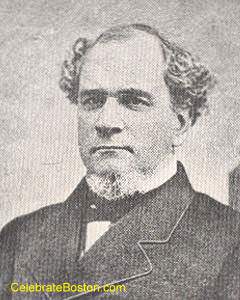 |
Mayor Frederick Walker Lincoln Jr.
Second Administration, 1863-1866
"Born in Boston, February 27, 1817; died September 13, 1898; served as Mayor of Boston during 1863-1866. His first administration was from 1858 to 1860.
Mayor Wightman had wished to be re-elected, but was defeated because the people felt the need of a stronger guiding hand and a more careful preservation of public moneys.
On Mayor Lincoln fell the great burden of being the chief magistrate during the Civil War, and in those troublous times incidents occurred which greatly added to his tribulations, such, for instance, as the draft riot.
At the time of the war, the relief of the poor became a particularly pressing question, and Mayor Lincoln had to make needful improvements in the methods of providing relief and preventing undue waste. The most important new undertaking in Mayor Lincoln's second administration was the building of the new Chestnut Hill Reservoir. The cost of this work was over $2,000,000. The new City Hall had been finished and was dedicated on September 18, 1865, with becoming ceremony.
During the last year of Mayor Lincoln's incumbency the General Court authorized the city to assess abutters who benefited by street improvements.
Mayor Lincoln's administration had inevitably been an expensive one, notwithstanding the efforts to keep the outlay as low as possible.
The state levies, the bounty tax, and the continued rise in prices, had raised the expenditures to over $6,000,000 in 1864. It became necessary to advance the tax rate to $13.30, and in 1865 to $15.80, which provided sufficient funds not only to pay the expenditures of the last mentioned years which amounted to more than $6,000,000, but to payoff $736,000 on the net debt.
The expenditures rose still further in 1866, but by increasing valuations it became possible to reduce the net debt by $500,000, although the tax rate had been lowered to $13. In other words, at the end of the war the debt was only $625,000 larger than in 1861, a very great achievement, for the requirements of the war had been met in a liberal manner, and the city activities had not been dangerously curtailed."
